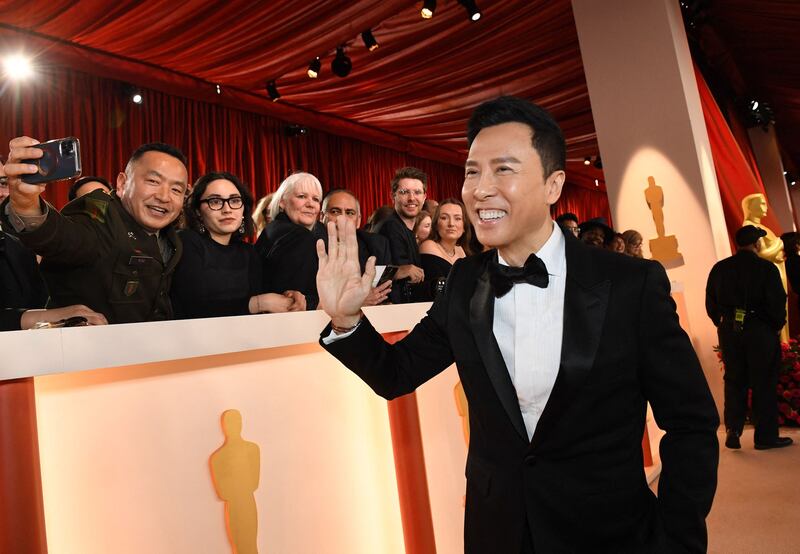Martial arts star Donnie Yen introduced a performance at the Oscars award ceremony on Sunday night, amid protests outside the venue over his ties to the Chinese Communist Party and lack of support for the 2019 protest movement in Hong Kong, which he has termed “a riot.”
The Star Wars actor introduced a performance of best song nominee “This is a Life” from “Everything Everywhere All at Once” which swept the Academy Awards including a best actress win for Michelle Yeoh, despite growing calls on the event organizers to uninvite him, with critics citing his support for Beijing's official propaganda about the city's pro-democracy movement.
Prominent pro-democracy activists and Chinese dissidents gathered outside the Dolby Theater on Sunday night, holding up banners satirizing Yen's support for the Chinese Communist Party, including a photo of him with supreme leader Xi Jinping.
“Say no to CCP puppet. Say no to Donnie Yen,” read one banner, while another said: “Donnie Yen is not a hero: he values zero,” emblazoned on a photo of Yen shaking hands with Xi in a celebrity line-up. Another protester displayed the slogan of the 2019 protest movement, which is now banned in Hong Kong under a draconian national security law banning criticism of the government: “Free Hong Kong, revolution now.”
Hollywood and the CCP
The protest, which was attended by former 1989 student leader Wang Dan, came as a petition on Change.org calling for Yen to be dropped from the ceremony garnered more than 100,000 signatures.
Wang told the protest that Yen, who described the 2019 protest movement as “a riot” in an interview with GQ Hype magazine, had “rubbed salt into the wounds of the people of Hong Kong, and insulted Hong Kongers.”
“Donnie Yen isn’t worthy of the name Hong Konger,” he said.
Security around the awards ceremony was tight, with a police cordon around the venue and several streets in the surrounding area sealed off by police, Wang said via his Twitter account, adding that around 200 people had turned up for the rally.
“Shame on [the] Oscar[s],” Wang tweeted, with an award icon.
Wang said he had earlier written to the newly established United States House Select Committee on Strategic Competition between the United States and the Chinese Communist Party, describing Yen's role in the ceremony as “a Chinese cultural invasion of the United States.”
“I have called on them to pay close attention to Hollywood and the Academy ... and to ensure that the relationship with China and the Chinese Communist Party isn’t one of collusion and vested interests,” he said.
Yen is a member of the Chinese People’s Political Consultative Conference of non-government advisers that includes party elders, intelligence officers and scholars, as well as movie stars, CEOs of major companies and other celebrities.
Yen told GQ Hype magazine in a recent interview after being asked about the boycott of his movies and his view of the 2019 protest movement: “It wasn’t a protest, OK, it was a riot.”
"A lot of people might not be happy for what I'm saying, but I'm speaking from my own experience," said Yen, using very similar language to official descriptions of the protests.

‘He has gotten this wrong’
Taiwan-based petition co-author Tong Wai Hong, said he was disappointed that the petition hadn't worked, although he had personally presented it to the organizers.
“It wasn’t surprising that the public outcry was ignored, but I am really disappointed,” Tong said. “I’m just a regular person, not an organization, and I’m not a political figure.”
Tong, who was acquitted of “rioting” charges linked to his role in the 2019 protest movement, told Radio Free Asia in an earlier interview that what unfolded in that year couldn't be described as “rioting.”
“For me and for a lot of other people, it was a fight against tyranny,” Tong told RFA on March 7. “He has gotten this wrong. The Chinese Communist Party has carried on restricting our freedoms and suppressing our human rights ever since the 2019 protests.”
He cited the banning of documentaries and other cinematic works linked to the protests, under a draconian national security law imposed on Hong Kong by Beijing from July 1, 2020, which ushered in an ongoing crackdown on peaceful dissent and political opposition that has seen dozens of former pro-democracy lawmakers stand trial for "subversion" for taking part in a primary election to maximize their seats in the Legislative Council.
Boycott began in 2019
Many Hong Kongers started boycotting Yen's movies over his pro-Beijing stance during the 2019 protests against the erosion of Hong Kong's promised freedoms and judicial independence that saw pitched battles between protesters armed with bricks, Molotov cocktails, catapults and other makeshift weapons against fully equipped riot police who fired huge quantities of tear gas, rubber bullets, chemically treated high-pressure water cannon and occasionally live rounds of ammunition at protesters and journalists.
Rights groups criticized the unsafe and indiscriminate use of tear gas and other forms of police violence during the months-long protest movement that left nearly two million adults suffering from post-traumatic stress symptoms and depression, according to The Lancet medical journal.
Police violence against young and unarmed protesters early in the movement brought millions onto the city's streets and prompted the occupation of its international airport, while unarmed train passengers were attacked by armed riot police at Prince Edward MTR and by white-clad mobsters at Yuen Long MTR, who laid into passengers and protesters with rods and poles while police took 39 minutes to answer hundreds of distress calls from the scene.
Translated by Luisetta Mudie. Edited by Matt Reed.
